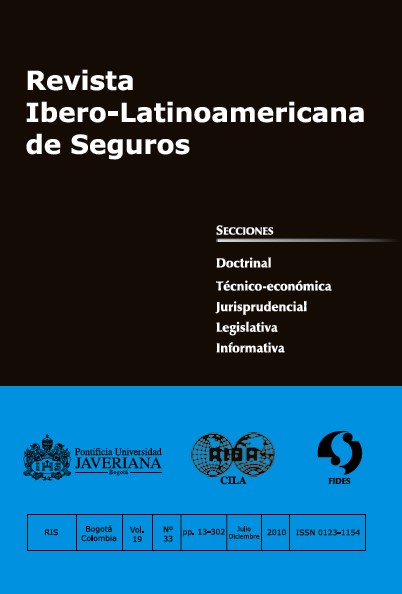Abstract
The modalities of obligation entailed by civil liability have changed from a sanction- oriented structure motivated by the intention to discipline the wrongdoer (civil liability) to a repairing perspective focused on the victim and her expectation of integral redress (the Law of Damages). Today, anti-juridical behavior has lost its feature of being an assumption to indemnify, and damage is the center of the juridical system, based on the expectation of redress. The ontologic substitution of tools available to administer justice, e.g.: making factors of attribution objective, consideration of futures needs of the victim of the wrong as damage in themselves, and the new contents of what justice administration means (minimization of non-valuable consequences of damages) have profoundly changed all legal implications and the presence of expected damages, being reflected in the Insurance Law due to its most important object which is the risk. In this process, our subject matter adopts new viewpoints that require either putting the most traditional institutions into concepts –for example, the civil liability insurance policy– originated in times in which the duty to repair or the duty of redress exhausted by themselves any legal imposition when determining redress or the substitution of its customary structures for ones that are much more adequate to the common current notion of Justice. We tend to clearly favor the second of these options.
This journal is registered under a Creative Commons Attribution 4.0 International Public License. Thus, this work may be reproduced, distributed, and publicly shared in digital format, as long as the names of the authors and Pontificia Universidad Javeriana are acknowledged. Others are allowed to quote, adapt, transform, auto-archive, republish, and create based on this material, for any purpose (even commercial ones), provided the authorship is duly acknowledged, a link to the original work is provided, and it is specified if changes have been made. Pontificia Universidad Javeriana does not hold the rights of published works and the authors are solely responsible for the contents of their works; they keep the moral, intellectual, privacy, and publicity rights.
Approving the intervention of the work (review, copy-editing, translation, layout) and the following outreach, are granted through an use license and not through an assignment of rights. This means the journal and Pontificia Universidad Javeriana cannot be held responsible for any ethical malpractice by the authors. As a consequence of the protection granted by the use license, the journal is not required to publish recantations or modify information already published, unless the errata stems from the editorial management process. Publishing contents in this journal does not generate royalties for contributors.


